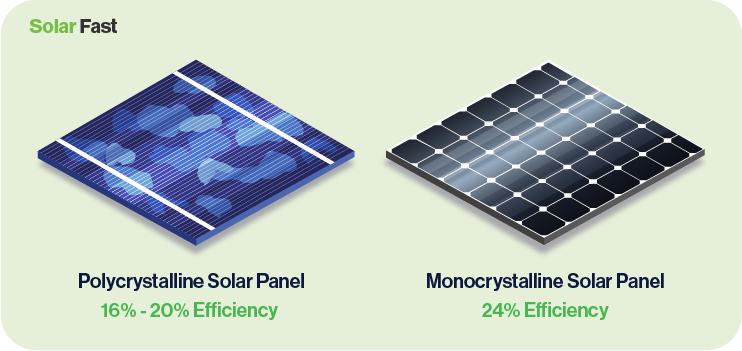What’s in colour?
The colour of a solar panel does actually have a bearing on what type of panel it is.
Polycrystalline panels, cheap but less efficient, are blue, while Monocrystalline panels, which are much more efficient, are black.
So, not only do monocrystalline panels look super sexy, but they also perform brilliantly and are the latest in solar panel technology.

Why all black solar panels?
Well, they look far more aesthetically pleasing! They are also a better suited panel for residential installations and especially in the UK.
Black absorbs light much better than any colour, we all feel this when we wear our black clothes in summer or get in a black car.
This is great on most days in the UK, the daylight is ‘captured’ better and that leads to more efficient production of energy.
It can lead to less efficiency if temperatures start to rise to the high 30s. This leads to the silicon heating up and becoming more resistant, making it harder for the electricity to move across the solar cell.
That said, they are still the most efficient panels you can buy for domestic installation as they produce more electricity per square metre.
Learn more about solar panel efficiency.
Types of black solar panels.
The choices don’t just stop at black cells though, different manufacturers also work on making panels look as aesthetically pleasing as possible.
Sometimes a design idea may have a bearing on the performance of the panel – both good and bad.

Black frame – with white backing
A black frame can really make a difference to the look of a panel without causing too many problems with efficiency or performance.
The white backing will reflect a bit of the daylight back into the silicon crystals, so it can improve performance, but you are unlikely to see a huge increase in power output.
You’ll be able to see the backing through the cells a little and it will give you that chessboard appearance.
Black backing and frame
If you don’t want that chessboard effect then the simple answer is to change the backing to a darker colour – any colour, so long as it’s black!
Having a black background on your panel will prevent daylight from bouncing back into the cells.
This can be slightly detrimental in winter and less detrimental in summer – in winter the daylight won’t be reflected back into the silicon crystals and that will decrease the ‘extra’ power slightly, but in summer the backing will absorb the extra daylight and reduce the overall heat of the panel, also reducing reduce the resistance of the silicon, and keep the panel’s efficiency at a satisfactory level.
You may be able to see the connecting wires if you get close but the panels will look almost completely black from the ground.
No wires on the surface
If you don’t even want to see the wire then you’re in look as all black panels are the last word in PV panel design.
Of course, Solar Fast supplies Type 1, 108 Half Cell Monocrystalline panels with Sun Fast’s patented technology that replaces front facing wire connection with back contacts hidden underneath the wafer!
So, the panels are smooth, black on black deliciousness!
Conclusion
Of course, what panels you want will be purely down to personal taste and what system you opt for.
Blue, or polycrystalline, panels may not be as aesthetically pleasing as their black counterparts, or as efficient, but they are significantly cheaper.
So, if you have space and aren’t bothered by the blue chessboard look, they are perfectly good for producing your power.
However, we think the black-on-black panels are perfect for roof top installations as they are more efficient, more modern and they look cool as you like!







